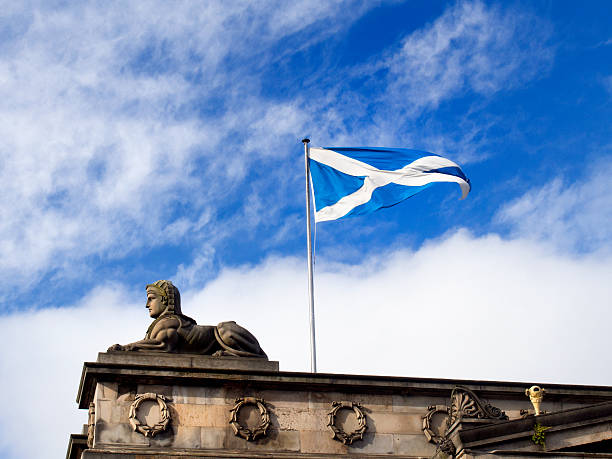|
Boxing up some books for a
Scots charity, I came across one I certainly wasn't going to let go. It
has gone well beyond its 26th edition and just keeps on going. Such is
the enduring popularity, two decades on, of a New York Times bestseller
"The Scottish Enlightment: The Scots' invention of the Modern World".
Highlighting how Scotland all but created our modern world and
everything in it, it's written by esteemed American historian, academic
and author Arthur L. Herman, a Senior Fellow at Hudson Institute in
Washington DC and University of Edinburgh semester-alumnus.
I recall how I was kindly gifted the book by the former US British
Consulate General, a Scot John Rankin after I had caught up with him via
Scottish Development International, based in the same building 1
Broadway in Cambridge, Ma.
Confession time: I was "bunking off" for a couple of hours from
attending a Microsoft conference in Boston, on behalf of The Scotsman (I
still managed to write a grand piece for said newspaper).
Below is an abridged and
partially rewritten version of a column I produced for the much-missed
"Scottish Review". Herman, along with writing books about Joseph
McCarthy, Gandhi and Churchill, singles out Scotland stating we should
not forget the "crucial part" it played. (Published by Arthur Herman -
Crown Publishing Group, Three Rivers Press.)

The Scottish Miracle
During Herman's academic spell, including a B.A. from University of
Minnesota and M.A. and Ph.D in history from John Hopkins University, and
his semester at University of Edinburgh, the keen young student gained
inspiration on realising then how, in essence, Scotland's turbulent
history, from William Wallace to the Presbyterian Lords of the Covenant,
laid the foundations for the "Scottish miracle".
It should be emphasized that this is no rosy glow account but a
no-holds-barred appraisal. The process, for all its "faults and
failures, blind spots and injustices" is well worth scrutinising, he
claims.
Especially now as Scotland moves forward towards its new and uncertain
future, where it should not forget its achievement; any more than it
should forget its earlier, pre-modern past.
In particular, Herman states: "As the first modern nation and culture,
the Scots have by and large made the world a better place. They taught
the world that true liberty requires a sense of personal obligation as
well as individual rights. They showed how modern life can be
spiritually as well as materially fulfilling.
Confidence in the Future
Also how a respect for science and technology can combine with a love
for the arts; how private affluence can enhance a sense of civic
responsibility; how political and economic democracy can flourish side
by side; and how a confidence in the future depends on a reverence for
the past."
Adding: "The Scottish
mind grasped how, in Hume's words: 'liberty is the perfection of civil
society' but 'authority must be acknowledged essential to its very
existance'. How a strong faith in progress also requires a keen
appreciation of its limitations."
The book does, however, carry with it a warning of what is described as
"suffering from a profusion of very general surveys, a multitude of
specialised surveys and monographs, and not enough good books in
between."
Learning from History
He warns of historians who write for a general audience tending to be
drawn in the more romantic episodes in Scottish history. Self-effacing
he highlights how, in recent decades, a trio of scholars have set out to
correct this problem.
They are: Thomas Devine's "The Scottish Nation: A History 1700-2000", an
"invaluable guide to the economic and social history of modern Scotland,
along with some other of his writings; Professor Bruce Lenman at St
Andrews University, with books such as "The Jacobite Risings in Britain,
1689-1746; and John Prebble's trio covering the defeat of Highland
Scotland "he spent a lifetime trying to uncover the forgotten tragic
episodes of modern Scottish history and make them come alive for the
modern reader."
Arthur Herman achieves, in my view, a comprehensive appraisal but
perhaps more a case of, rather than "Scots invention of the modern
world" - more like Scotland did indeed have a disproportionate influence
on the planet. Other examples? Ancient Athens, Medieval China and
Renaissance Italy.
Crucial point in American development
He covers this by stressing at the outset that obviously, the Scots did
not do everything by themselves: other nations including Germans,
French, Italians, Russians, English, have their place in the making of
the modern world.
It's just, the Scots more than anyone else who "created the lens"
through which we see the final product. When we gaze out on a
contemporary world shaped by technology, capitalism and modern
democracy, struggling to find our place as individuals in it, we are in
effect viewing the world as the Scots did.
The Scottish Enlightment is inseparable from its legacy. The age of Adam
Smith, David Hume, James Watt, Robert Adam and Robert Burns; when
Glasgow, Aberdeen and Edinburgh were the "triple wellsprings of the
modern mind", is not just an episode in Scottish history.
It also marks a crucial point in America, development of the British
Empire and Europe, not to mention the United Kingdom. Summing up. I do
like the comment, when during a school exchange in Nebraska, a Scot was
asked if we had television in Scotland? The reply: "We invented it." |

